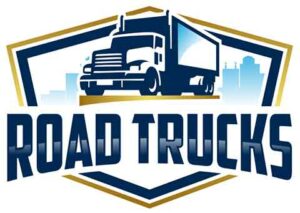It is that time of year – you are moving! It’s time to pack up your things in a U-Haul trailer that you recently picked up and attached to your vehicle. As you prepare for your departure, you wonder; how fast you can drive with a U-Haul trailer? And is there any other helpful information that I need to know?
When towing a U-Haul trailer, its maximum speed is 55 miles per hour, regardless of the size or the make. It is crucial to follow the speed limit to avoid fines and legal charges. Going faster than 55 miles per hour is dangerous when braking because U-Haul trailers do not have brakes.
We have what you need to know to learn other important information you need to know when renting a U-Haul, such as trailer types, typical costs, and trips while driving; make sure to continue reading below!
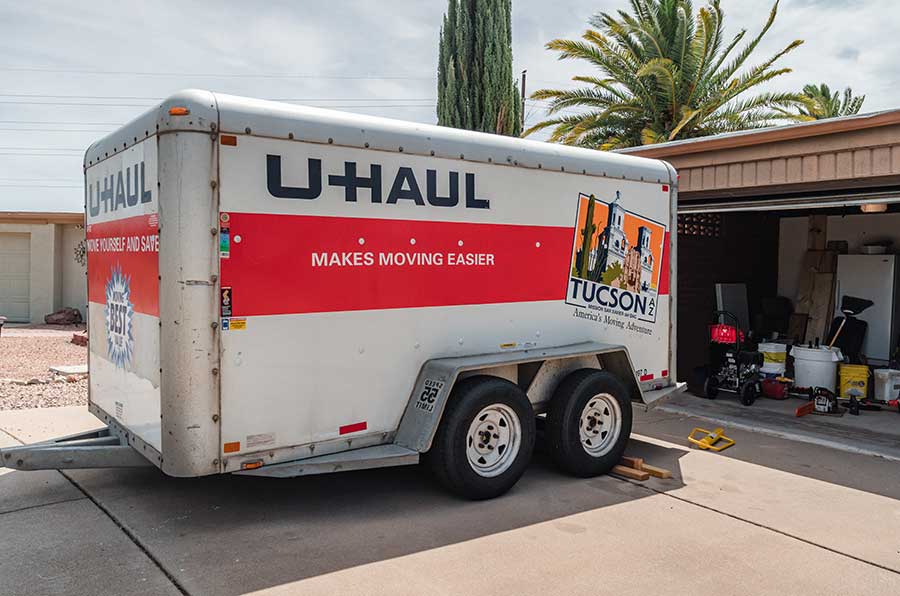
Contents
Why Can I Only Go 55 Miles Per Hour?
When driving on the highway, 55 miles per hour can seem like a mundane pace, especially if the speed limit for the other cars is 80 miles per hour. However, to avoid legal charges, you can not go over 55 miles per hour when towing a U-Haul trailer. Why is this? Why can I only go 55 miles per hour?
In the United States, you can not legally go over 55 miles per hour if your trailer does not have proper trailer brakes. Unfortunately, all U-Haul trailers do not have trailer brakes. This is why the speed limit is so low! Not only can you get a ticket, but it’s also very dangerous to go over 55 miles per hour in a trailer with no brakes! If winds are high or a quick stop arises, the trailer’s weight can be dangerous to you, or you can begin fishtailing.
Technically speaking, you can go faster than 55 miles per hour while a U-Haul trailer is hooked up to your car. However, if you do drive faster, you pose room for danger or a possible car accident. Depending on the amount of cargo you have in your trailer, your driving experience, the weather, and what kind of car is towing your trailer, you can easily get hurt while going over 55 miles per hour. So, to follow the law and keep yourself safe, you cannot exceed this speed limit.
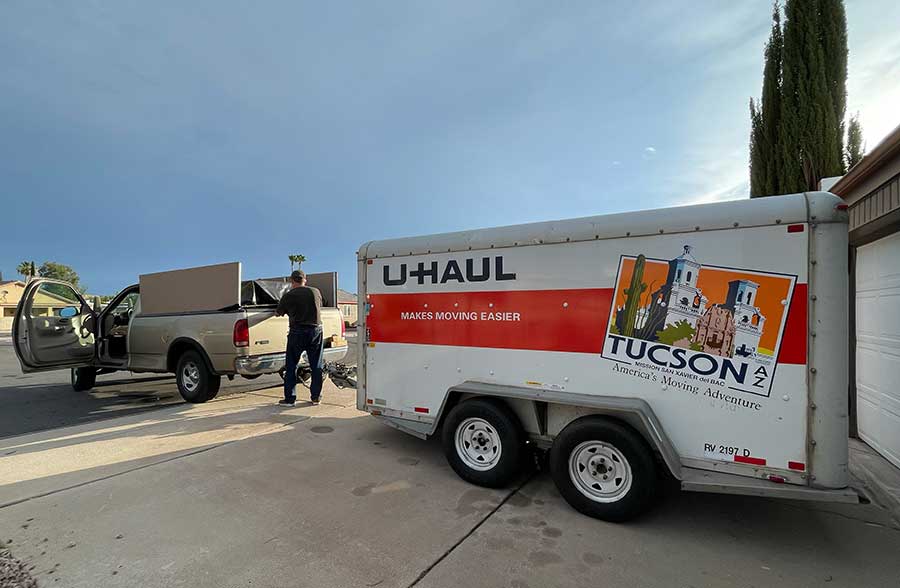
How Should I Drive a U-Haul Trailer?
When pulling a trailer, the recommended driving speed in town is 30 miles per hour. This is because it is required to drive defensively when towing a trailer. Driving defensively means anticipating stops, braking early, and never following other cars closely. Before going downhill, you must drive slowly or shift into a lower gear. If you ride the brakes, you will damage your vehicle and possibly the trailer.
The same mindset goes for driving uphill! Drive slowly or shift the vehicle into a lower gear. Keep an eye on the temperature gauges and pull to the side of the road if the vehicle’s engine gets too hot; otherwise, your engine will stall. If you are going uphill and are driving under 45 miles per hour, turn on your hazard lights. Keep slow for curves, harsh road conditions, bad weather, highway exits, and road construction.
The rule of thumb when towing a U-Haul trailer is to drive slowly and cautiously! Do not allow passengers to ride in the trailer, as they can get easily injured from heavy cargo, do not drive while fatigued or distracted, and keep a seat belt on.
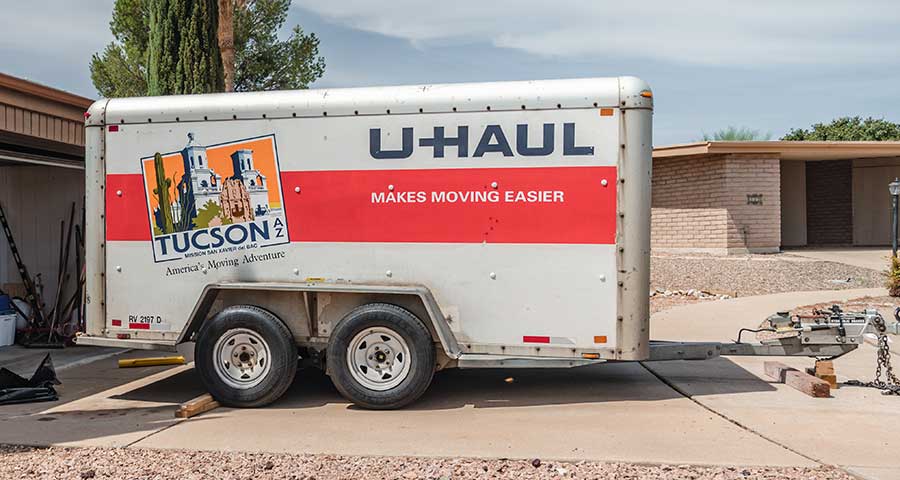
8 Tips Before Driving With A Trailer
- Stay Within Your Limits
- Pack your trailer properly
- Check your tires.
- Match the hitch ball to the trailer.
- Use trailer safety chains.
- Check trailer lights
- Check Your Brakes
- Adjust Your Mirrors
What Kind of U-Haul Trailers are There?
Thankfully, U-Haul has a wide range of trailers available! Whether you are a college student driving to your university campus for your first day of the semester or transporting some product for a new building site, U-Haul has the trailer that you will need. Consider this a “cheat sheet” that allows you to know what U-Haul trailer to rent, and we will continue to go through what the difference is between cargo and utility trailers.
| Trailer Type | Maximum Load | Intended Use |
| 4×8 Cargo Trailer | 1,650 pounds | Short or long-distance moves |
| 5×8 Cargo Trailer | 1,800 pounds | Short or long-distance moves, most economic cargo option |
| 6×12 Cargo Trailer | 2,480 pounds | Short or long-distance moves, no mileage fee |
| 4×7 Utility Trailer | 1,770 pounds | Easy towing for cargo |
| 5×8 Utility Trailer | 1,890 pounds | Easy towing, landscaping, or building materials, the most economical utility option |
| 5×9 Utility Trailer with Ramp | 1,650 pounds | Short or long-distance moves hold cargo |
| 6×12 Utility Trailer | 2,670 pounds | Building materials, large cargo, short distances |
| 6×12 Utility Trailer with Ramp | 3,710 pounds | Motorcycle trailer, large cargo, building materials |
Related Article: U-Haul Trailer Types
For starters, cargo trailers are best for moving because they have an enclosed top and aerodynamic build. The 4×8 and 5×8 cargo trailers are lightweight and easily pulled by any vehicle with a towing package. They are great for college students, newlyweds, or people who need to bring a lot of luggage on a long cross-country trip.
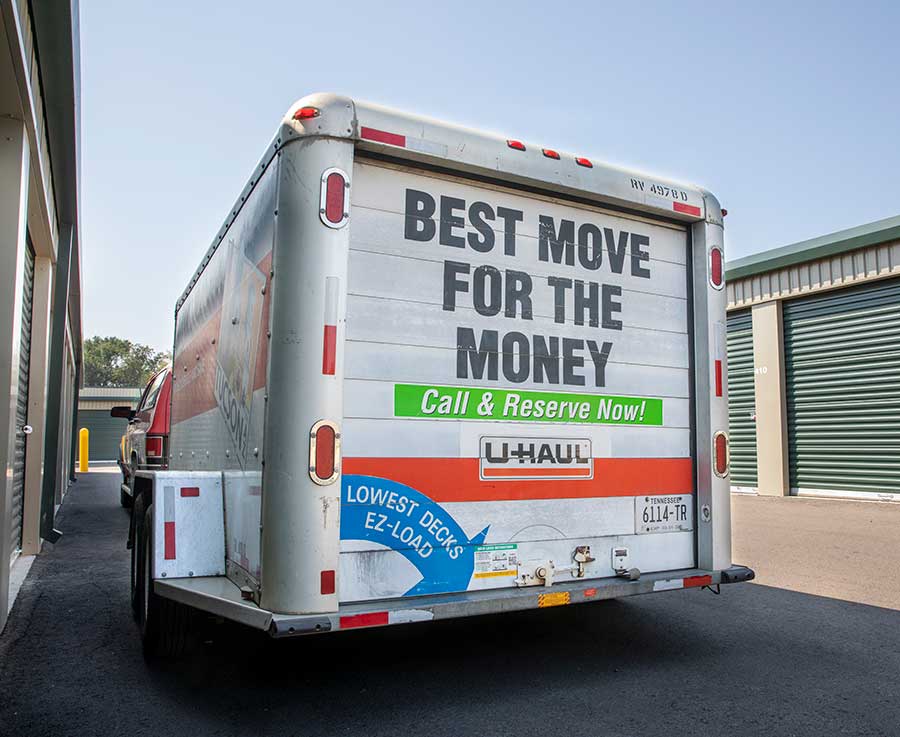
Trailers are great for small four-wheeled vehicles, transporting products, or even just holding some cargo if tied down correctly. Trailers are helpful, but most do not have an enclosed top. Luckily, many U-Haul trailers are enclosed, so you won’t have to tie down the furniture you put inside.
What Else Do I Need to Know about U-Haul Trailers?
Take time to plan your trip, how long you need a trailer, and what you will be using a U-Haul trailer for! Trailer rates are dependent on where you are going. A trailer for in-town travel starts at a rate of $14.95 per day, but this can be increased depending on your town. One-way rates are determined by trailer size, where you started, and where you are going.
However, expect to pay much more than $14.95. There may be other fees such as mileage fees, damage protection fees, taxes, gas, equipment rentals, and environmental fees, just to mention a few.
Before you leave on your trip, you will need to tell know what type of U-Haul trailer you are wanting to rent, the make of your car, and your travel schedule so you can be prepared before you pick up the trailer.
